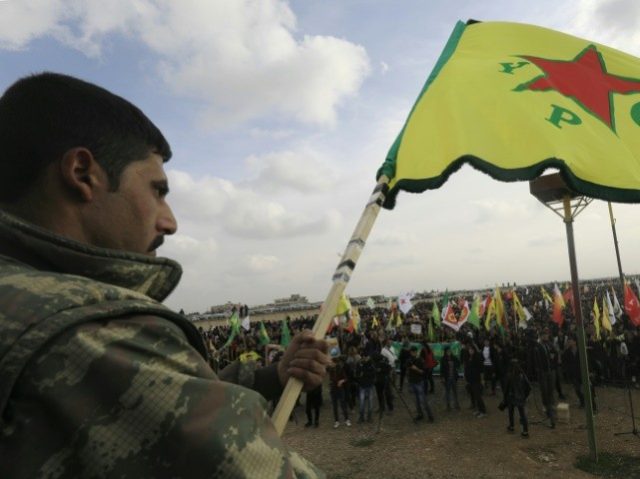Turkey’s military General Staff claimed on Tuesday that its “Operation Olive Branch,” an invasion of Afrin in northern Syria, killed “at least 260” Kurdish and Islamic State terrorists. The United States and its Syrian Kurdish allies have both denied there being a significant ISIS presence in that area.
The claims recall a similar argument forwarded by Syrian dictator Bashar al-Assad and the Russian government for invading Aleppo, a city with a heavy anti-Assad rebel population but negligible Islamic State presence.
The Turkish military issued a statement Tuesday identifying those killed in the Afrin operation as “PKK/KCK/PYD-YPG and Daesh [ISIS] terrorists.” The PKK is the Kurdistan Workers’ Party (PKK), a Marxist, anti-Islamist terrorist organization. The YPG (People’s Protection Units) is a Syrian Kurdish militia allied with the United States that has significantly contributed to the defeat of the Islamic State in Syria, particularly in Raqqa. The PYD (Democratic Union Party) is the political party affiliated with the YPG.
The Turkish government considers the YPG, PKK, and ISIS indistinguishable from each other despite the fact that many American military experts suggest that some of the largest victories against ISIS, including the fall of Raqqa, would not have been possible without the YPG.
The YPG has controlled Afrin, part of Syrian Kurdistan (Rojava), throughout the Syrian Civil War and maintained it as a “relatively stable” area in the war-torn country, according to Secretary of Defense James Mattis.
“These terrorist organizations [PYD, PKK, Daesh, YPG, the far-left DHKP-C] are all the same […] These are terrorist groups serving the same purpose in the same scenario with different roles,” Turkish President Recep Tayyip Erdogan argued in remarks on Wednesday.
The DHKP-C is a communist terrorist organization that has not traditionally promoted Kurdish nationalism.
Both the American government and the YPG have denied that any evidence exists that the Turkish military has neutralized ISIS targets in Afrin, noting that those targets do not exist.
Asked about Ankara’s claims during a regular department press briefing on Tuesday, State Department spokeswoman Heather Nauert categorically denied the existence of Islamic State targets in Afrin, saying, “No, we don’t. We do not see ISIS in that area.”
Nauert refused to answer, however, whether the Syrian Kurdish forces being attacked had “a right to defend themselves” from Turkish aggression, instead insisting on “further de-escalation of violence.”
The Syrian Democratic Forces (SDF), a U.S.-backed coalition largely consisting of YPG fighters in concert with other ethnic minorities in the country, also denied Turkey’s claims. “The whole world knows Daesh (Islamic State) is not present in Afrin,” a senior SDF official told Reuters.
The YPG had such stable control of the region that the Russian government also sought to capitalize on it last year. Reports began circulating in March that the YPG—which cooperates with both Russia and the United States, its singular focus on attacking ISIS—would allow Russia to set up a military base in Afrin.
“The Russian presence … comes in agreement between [the YPG] and the Russian forces operating in Syria in the framework of cooperation against terrorism and to help train our forces on modern warfare and to build a direct point of contact with Russian forces,” a YPG spokesman announced.
Russia denied the reports, however, and the deal never materialized. The Russian government has since reportedly suggested to the YPG that it would help deter the Turkish invasion if the Kurds hand Afrin over to Assad. The YPG and Assad’s troops have largely avoided each other during the civil war; Assad has targeted attacks against anti-Assad rebels while the YPG focused on ISIS.
Damascus has aggressively condemned Turkey’s presence within Syria’s borders and threatened to shoot Turkish planes out of the sky if they violate Syria’s sovereignty.
The violence in Afrin under Turkish invasion has killed at least 28 civilians, according to the UK-based Syrian Observatory for Human Rights (SOHR). The Turkish government insists it is painstakingly avoiding targets near civilians in the area.
Erdogan has also warned he may not stop at Afrin.
“There was an operation during Mr. Obama’s administration. That operation aimed to clear terrorists from Manbij. But he failed to keep up to his promise and cheated us,” Erdogan said on Wednesday, Turkish newspaper Hurriyet reported. “We’ve done our part but they have not. They promised they would send the terrorists in this area to the east of the Euphrates and leave Manbij to its rightful owners. But they did not keep their promise.”
“The terrorists” in this case refer to the Syrian Kurds. Manbij is a city far east of Afrin and south of Turkey, where the U.S. maintains a military presence.
American officials have stated that Turkey may have “legitimate security concerns” in Afrin, but Manbij is far afield from the objective of Operation Olive Branch. President Donald Trump is expected to speak to Erdogan in a phone call Wednesday.

COMMENTS
Please let us know if you're having issues with commenting.